BusinessEurope Headlines No. 2021-31
Tripartite Social Summit: how to transform Europe’s recovery into lasting growth
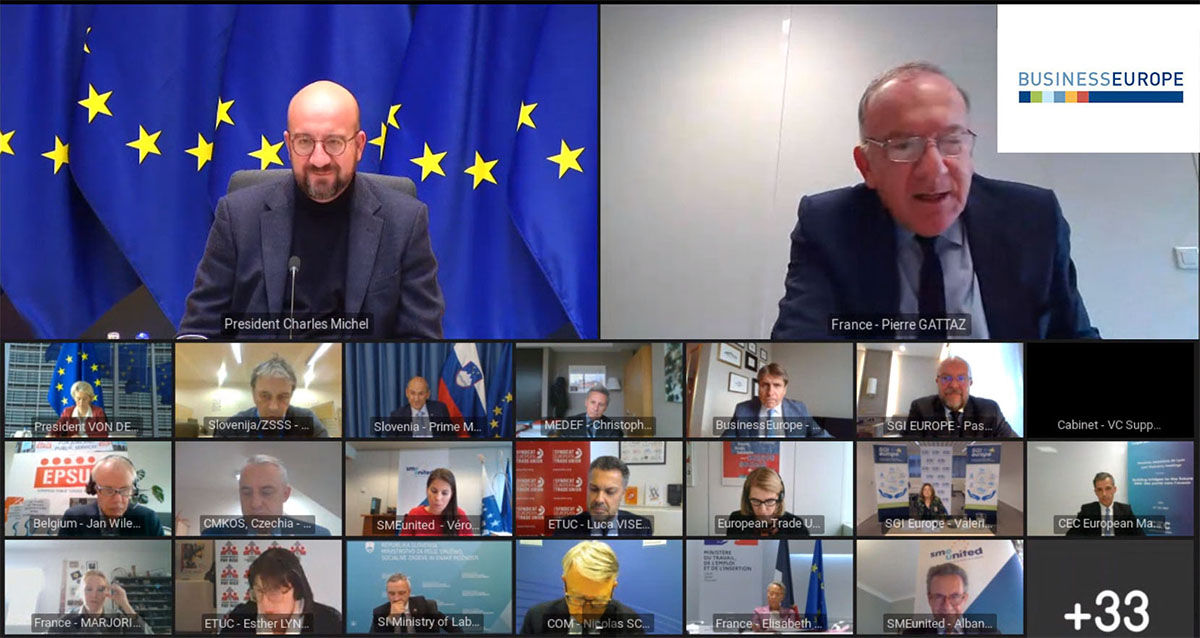
Speaking at the Tripartite Social Summit video conference on behalf of employers on 20 October, BusinessEurope President Pierre Gattaz highlighted that as the EU emerges from the pandemic, the European Council should focus on how to transform Europe’s recovery into lasting growth, inclusive prosperity and employment. He stated that Europe is moving towards operationalising its climate and digital ambitions, with opportunities but also very concrete challenges for small, medium and large enterprises, who are faced with rising energy and raw material prices, shortages of microchips, lack of skilled workers, financing investments and innovation. “These challenges need to be rapidly addressed if we want to remain competitive and keep pace with other global players. Unfortunately, there is not enough focus on bringing forward the necessary reforms to get a lasting recovery”, he said. The role of social partners, he added, has been crucial for the EU and Member States to design the labour market and social response to the Covid crisis. However, they were not properly consulted during the preparation of national recovery and resilience plans. “Involving them is all the more important in the implementation phase”, Gattaz pointed out. Read the full speech.
Contact: Maxime Cerutti
Our Comment
Foreign subsidies instrument dearly needed by European business
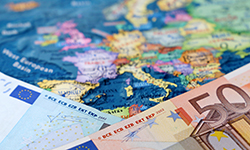 In recent years, the increasing activity in the EU market of companies benefitting from foreign subsidies has exposed a regulatory gap in the EU: there are clear rules and limits for state aid granted by EU Member States, but there is currently no way to tackle subsidies granted by third countries.
In recent years, the increasing activity in the EU market of companies benefitting from foreign subsidies has exposed a regulatory gap in the EU: there are clear rules and limits for state aid granted by EU Member States, but there is currently no way to tackle subsidies granted by third countries.
Two constraints make it particularly difficult to deal with foreign subsidies: on the one hand, there is a serious lack of transparency regarding the amounts of subsidies granted by non-EU governments. On the other hand, government support can come in many shapes and forms, including government grants, tax concessions, inputs provided to companies at below-market prices, below-market finance, or even targeted exemptions from regulatory requirements. All of these can give the beneficiary an unfair competitive advantage vis-à-vis market actors, but some are more difficult to prove than others.
A harmonised global set of disciplines on subsidies and state-owned enterprises (SOEs), complemented with far-reaching transparency requirements and strict enforcement measures, would of course be the ideal way to deal with this problem. However, countries that would be key for any meaningful outcome are currently unwilling to make meaningful concessions in this area.
The EU Foreign Subsidies Instrument proposed by the European Commission in May 2021 is thus key to deal with the problem posed by foreign subsidies in the Single Market. European companies dearly need measures that re-establish a level playing field in this area, and they need them soon. The proposal provides a good basis for the future instrument and has been broadly welcomed by the European business community. BusinessEurope adopted its reaction to the proposal on 13 October and stands ready to help make sure that the final instrument is effective, efficient and WTO compliant.
Ultimately, the instrument could also be a steppingstone towards a multilateral outcome by increasing the pressure on countries that are currently not willing to engage. In the meantime, the EU should keep working with likeminded partners towards a multilateral solution while engaging in a diplomatic effort to explain partner countries the rationale behind its new instrument.
![]() Contact: Benedikt Wiedenhofer
Contact: Benedikt Wiedenhofer
TISK Joint Dialogue Forum: main issues on future of work in Europe
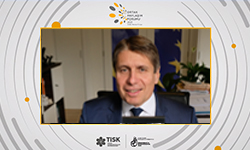 "Improving the global competitiveness and productivity of companies is the key to creating good jobs for people in Europe”, said Markus J. Beyrer, BusinessEurope’s Director General, at the joint dialogue forum on future of work organised by the Turkish Confederation of Employer Associations (TİSK) on 14 October 2021. After more than a year of COVID restrictive measures, Europe needs to go back to work. The way forward is to progressively move out of short-time work schemes and focus available recovery resources on improving active labour market policies. Increasing women’s employment is a priority. Young people’s transitions to the labour markets also need to improve, keeping in mind that apprenticeships have a key role to play to that end. But at this time, the digital and green transitions are at the core of the agenda on the future of work. There will be significant costs related to these transitions, and these costs need to be shared between businesses, workers, consumers, and citizens to adapt as quickly as possible to new ways of working and living. This is the number one question we see for the future of work in Europe.
"Improving the global competitiveness and productivity of companies is the key to creating good jobs for people in Europe”, said Markus J. Beyrer, BusinessEurope’s Director General, at the joint dialogue forum on future of work organised by the Turkish Confederation of Employer Associations (TİSK) on 14 October 2021. After more than a year of COVID restrictive measures, Europe needs to go back to work. The way forward is to progressively move out of short-time work schemes and focus available recovery resources on improving active labour market policies. Increasing women’s employment is a priority. Young people’s transitions to the labour markets also need to improve, keeping in mind that apprenticeships have a key role to play to that end. But at this time, the digital and green transitions are at the core of the agenda on the future of work. There will be significant costs related to these transitions, and these costs need to be shared between businesses, workers, consumers, and citizens to adapt as quickly as possible to new ways of working and living. This is the number one question we see for the future of work in Europe.
Contact: Maxime Cerutti
Morning Talks on International Issues: interview with Emma Marcegaglia
 “Morning Talks on International Issues” – a monthly interaction with high-level guests – kicked off on 14 October with Emma Marcegaglia, Chair of B20 Italy. Interviewed by Luisa Santos, BusinessEurope’s Deputy Director General, Marcegaglia presented the B20 Recommendations, which focused on supporting an open and rules-based trade, ambitious but pragmatic approaches on the environment and climate change, supporting digital transformation, skill-enhancement policies and emphasising the role of women in the global economy. The discussion focused on the global challenges that we face in the context of the COVID-19 pandemic and the recovery of the global economy as well as climate change and trade tensions. Asked whether we are currently witnessing the end of the global value chains, Marcegaglia stressed that even during the recent pandemic, the most successful companies were those that are international in their structure. She also highlighted the importance of open markets, even if in some cases supply chains became more regional. Regarding climate change, Marcegaglia underlined the importance of global cooperation, unity and pragmatism ahead of the COP26 in Glasgow. She urged governments to focus on enabling investments that will support innovation and the development of new technologies and instruments that will allow us to tackle this global challenge. Stay tuned for the next “Morning Talks on International Trade”, scheduled to take place in November.
“Morning Talks on International Issues” – a monthly interaction with high-level guests – kicked off on 14 October with Emma Marcegaglia, Chair of B20 Italy. Interviewed by Luisa Santos, BusinessEurope’s Deputy Director General, Marcegaglia presented the B20 Recommendations, which focused on supporting an open and rules-based trade, ambitious but pragmatic approaches on the environment and climate change, supporting digital transformation, skill-enhancement policies and emphasising the role of women in the global economy. The discussion focused on the global challenges that we face in the context of the COVID-19 pandemic and the recovery of the global economy as well as climate change and trade tensions. Asked whether we are currently witnessing the end of the global value chains, Marcegaglia stressed that even during the recent pandemic, the most successful companies were those that are international in their structure. She also highlighted the importance of open markets, even if in some cases supply chains became more regional. Regarding climate change, Marcegaglia underlined the importance of global cooperation, unity and pragmatism ahead of the COP26 in Glasgow. She urged governments to focus on enabling investments that will support innovation and the development of new technologies and instruments that will allow us to tackle this global challenge. Stay tuned for the next “Morning Talks on International Trade”, scheduled to take place in November.
Contact: Luisa Santos and Sofia Bournou
Global supply chains: transforming challenges into opportunities
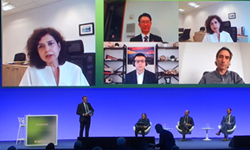 “Companies around the world are still facing many challenges related to COVID-19, such as increasing costs in raw materials and transport, lack of access to key components like semi-conductors, travel and mobility restrictions for workers. Some of these challenges might be temporary but others are here to stay and require adjustments from companies but also policy makers”, said BusinessEurope Deputy Director General Luisa Santos at the World Manufacturing Forum 2021 on 20 October. She stated that the way we address these long-term challenges, for instance increased vulnerability to cyberattacks, will determine our ability to transform challenges in opportunities. Companies are in the process of building resilience for future crisis by adopting risk mitigation strategies like diversifying suppliers, increasing safety stocks or improving lead times. “But governments have a critical role ensuring the right competitive environment that favours investment and supports companies’ efforts, for instance by promoting regulatory cooperation and the use of international standards”, she concluded.
“Companies around the world are still facing many challenges related to COVID-19, such as increasing costs in raw materials and transport, lack of access to key components like semi-conductors, travel and mobility restrictions for workers. Some of these challenges might be temporary but others are here to stay and require adjustments from companies but also policy makers”, said BusinessEurope Deputy Director General Luisa Santos at the World Manufacturing Forum 2021 on 20 October. She stated that the way we address these long-term challenges, for instance increased vulnerability to cyberattacks, will determine our ability to transform challenges in opportunities. Companies are in the process of building resilience for future crisis by adopting risk mitigation strategies like diversifying suppliers, increasing safety stocks or improving lead times. “But governments have a critical role ensuring the right competitive environment that favours investment and supports companies’ efforts, for instance by promoting regulatory cooperation and the use of international standards”, she concluded.
Contact: Luisa Santos
The rational for climate provisions in bilateral trade deals
 “Enforcement doesn’t equal sanctions. Sanctions punish misbehaviour, but they do not achieve per se a change on the ground, which is the ultimate goal. The key question is how to incentivise good behaviour”, said BusinessEurope Deputy Director Eleonora Catella at the webinar “Road to COP26 – Should Trade Policy be Leveraged to Enforce the Paris Climate Accord?”, organised by ECIPE on 20 October. She highlighted that even though countries have already committed to enforcing their Nationally Determined Contributions (NDCs) under the Paris Accord, including climate provisions in trade deals is still important because many countries are lagging behind on their Paris commitments. Furthermore, the Paris Agreement is binding but not enforceable, whereas the EU’s bilateral trade agreements offer tools for effective implementation and enforcement through the dispute settlement mechanism of their Trade and Sustainable Development Chapters.
“Enforcement doesn’t equal sanctions. Sanctions punish misbehaviour, but they do not achieve per se a change on the ground, which is the ultimate goal. The key question is how to incentivise good behaviour”, said BusinessEurope Deputy Director Eleonora Catella at the webinar “Road to COP26 – Should Trade Policy be Leveraged to Enforce the Paris Climate Accord?”, organised by ECIPE on 20 October. She highlighted that even though countries have already committed to enforcing their Nationally Determined Contributions (NDCs) under the Paris Accord, including climate provisions in trade deals is still important because many countries are lagging behind on their Paris commitments. Furthermore, the Paris Agreement is binding but not enforceable, whereas the EU’s bilateral trade agreements offer tools for effective implementation and enforcement through the dispute settlement mechanism of their Trade and Sustainable Development Chapters.
Contact: Eleonora Catella
Greening of the economy: employment and skills aspects
 The majority of jobs will undergo a deep transformation to adapt to greener production processes and methods. Bringing innovative low-carbon products or services to the market will also require adaptation of education and training systems to match new competence needs. “The truth is that the green transition will only succeed if it is economically viable”, reads BusinessEurope’s policy orientation note on the employment and skills aspects of the greening of the economy. The impact of greening will vary across sectors and regions; it will also have different timelines. Some economic activities are likely to cease to exist; the majority of others will undergo a profound change. Upskilling/reskilling to prepare employees for new jobs and new ways of working is very important. Accompanying the green transition is the shared responsibility of the government, employers and individual workers. Involvement of social partners at all levels is crucial to ensure that support measures correspond to the local labour market realities, sectoral specificities as well as workers’ and employers’ needs.
The majority of jobs will undergo a deep transformation to adapt to greener production processes and methods. Bringing innovative low-carbon products or services to the market will also require adaptation of education and training systems to match new competence needs. “The truth is that the green transition will only succeed if it is economically viable”, reads BusinessEurope’s policy orientation note on the employment and skills aspects of the greening of the economy. The impact of greening will vary across sectors and regions; it will also have different timelines. Some economic activities are likely to cease to exist; the majority of others will undergo a profound change. Upskilling/reskilling to prepare employees for new jobs and new ways of working is very important. Accompanying the green transition is the shared responsibility of the government, employers and individual workers. Involvement of social partners at all levels is crucial to ensure that support measures correspond to the local labour market realities, sectoral specificities as well as workers’ and employers’ needs.
![]() Contact Anna Kwiatkiewicz-Mory
Contact Anna Kwiatkiewicz-Mory
Social partners recommendations on circular economy and the world of work
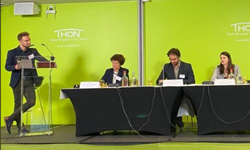 “Employment and social impacts are a key consideration in the transition to the circular economy”. This was one of the main conclusions of the European social partners’ project on circular economy and the world of work, presented during the final conference on 14 October. Bringing together EU policy makers, national and sectoral social partners, the conference highlighted the added value of social partners’ work to assess the opportunities and tackle the challenges posed by the transition to circular economy on jobs, competitiveness, skills and working conditions. The European social partners presented the results of their project, including key recommendations to policy makers and for social dialogue. Whilst acknowledging the different starting points and impacts in different countries, sectors and companies, the importance of well-functioning social dialogue to manage the process of change was seen as a priority across the board. The need for further public policies to facilitate the transition and education / re-skilling of the workforce were also key take-aways from the conference.
“Employment and social impacts are a key consideration in the transition to the circular economy”. This was one of the main conclusions of the European social partners’ project on circular economy and the world of work, presented during the final conference on 14 October. Bringing together EU policy makers, national and sectoral social partners, the conference highlighted the added value of social partners’ work to assess the opportunities and tackle the challenges posed by the transition to circular economy on jobs, competitiveness, skills and working conditions. The European social partners presented the results of their project, including key recommendations to policy makers and for social dialogue. Whilst acknowledging the different starting points and impacts in different countries, sectors and companies, the importance of well-functioning social dialogue to manage the process of change was seen as a priority across the board. The need for further public policies to facilitate the transition and education / re-skilling of the workforce were also key take-aways from the conference.
![]() Contact: Robert Plummer
Contact: Robert Plummer
Trans-European Transport Network: infrastructure for sustainable present and future needed
 On 14 December, the European Commission will publish its “Efficient and green mobility package” that will include the revised Trans-European Transport Network (TEN-T) Regulation. The TEN-T is of fundamental importance in terms of safety, as well as economic growth and environmental sustainability. It also acts as lifeline, which must always remain open and operational across borders, as demonstrated by the COVID-19 crisis. The upcoming revision is extremely relevant so that TEN-T is reinforced to meet the latest objectives of the green and digital transitions, prepared for any further potential crises hitting the continent, and maintained to remain sustainable in serving the essential needs of our societies today and tomorrow. It is indeed a strategic revision that awaits us.
On 14 December, the European Commission will publish its “Efficient and green mobility package” that will include the revised Trans-European Transport Network (TEN-T) Regulation. The TEN-T is of fundamental importance in terms of safety, as well as economic growth and environmental sustainability. It also acts as lifeline, which must always remain open and operational across borders, as demonstrated by the COVID-19 crisis. The upcoming revision is extremely relevant so that TEN-T is reinforced to meet the latest objectives of the green and digital transitions, prepared for any further potential crises hitting the continent, and maintained to remain sustainable in serving the essential needs of our societies today and tomorrow. It is indeed a strategic revision that awaits us.
BusinessEurope’s Transport working group discussed the upcoming TEN-T Regulation revision over the past months, including at its last meeting of 19 October. The group agreed on its comments, which have been shared with European Commissioner for Transport Adina Vălean and the Directorate-General for Mobility and Transport. BusinessEurope stresses that two main time horizons need to be clearly distinguished and backed with substantial financing: adapting the infrastructure to the future mobility needs; and filling the existing investment gaps urgently, as these gaps do not allow to progress with the future transition needs or even meet the needs of today. Six key tasks are put forward in our position:
- Focus on completion of missing links and improved interconnectivity, capacities and safety across all modes of transport, which should include the objective of enhancing the role of terminals in the governance of the core network corridors.
- Benefiting from potential synergies with the frameworks for the Trans-European Telecommunications Network (eTEN) and for Energy (TEN-E) where they serve the sustainable transport objectives.
- Promoting a modern infrastructure for alternative fuels for all modes of transport, while upholding the maintenance of key existing networks.
- Setting mandatory deployment targets for alternative fuels infrastructure in the TEN-T and beyond, maintaining the technological neutrality.
- Fostering physical infrastructure enhancements that enable effective digital feeds and incentivise cooperative communication across all modes of transport in order to speed up digitalisation.
- Avoiding bureaucratisation and administrative burdens in the governance of TEN-T.
BusinessEurope is also discussing the ongoing revision of the European Investment Bank’s Transport Lending Policy, as it is a significant building block in the transport financing architecture of the EU. We are preparing our reflection and input to the EIB’s public consultation by the set deadline of 29 October.
![]() Contact: Martynas Barysas
Contact: Martynas Barysas
Business and human rights: debate with policy makers
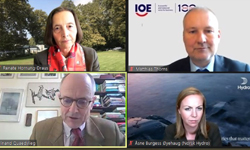 “Companies are committed to respecting human rights, but we can’t do it alone. More actions are needed by states to address root causes of human rights abuses. And to make more progress, we need to promote collective efforts with business and stakeholders”. This was the key message of the joint BusinessEurope – International Organisation of Employers (IOE) webinar on 18 October on business engagement on the business and human rights agenda. Ten years on from adoption of the United Nations Guiding Principles (UNGPs) on Business and Human Rights, business representatives, companies and EU policy makers came together to discuss the conditions for progress. The UNGPs were once again highlighted as the authoritative framework for action. However, more support is needed for companies to stay and behave rather than cut and run. Collective approaches will be key to increase leverage to solve issues, rather than focusing on putting obligations on individual companies.
“Companies are committed to respecting human rights, but we can’t do it alone. More actions are needed by states to address root causes of human rights abuses. And to make more progress, we need to promote collective efforts with business and stakeholders”. This was the key message of the joint BusinessEurope – International Organisation of Employers (IOE) webinar on 18 October on business engagement on the business and human rights agenda. Ten years on from adoption of the United Nations Guiding Principles (UNGPs) on Business and Human Rights, business representatives, companies and EU policy makers came together to discuss the conditions for progress. The UNGPs were once again highlighted as the authoritative framework for action. However, more support is needed for companies to stay and behave rather than cut and run. Collective approaches will be key to increase leverage to solve issues, rather than focusing on putting obligations on individual companies.
![]() Contact: Rebekah Smith
Contact: Rebekah Smith
Is India shifting policy on international trade?
 Speaking at the at the India Trilateral Forum on 20 October, Adviser for International Relations Elena Suárez stated that “the restart of trade negotiations with India has been very well received by the European business community. We consider that the economic and geostrategic importance of India as well as the huge untapped potential of its market are worth the effort of pursuing negotiations with the country.” The event, organised by the German Marshall Fund, explored India’s stance on international trade and free trade agreements (FTAs), in light of the recent decisions to fast-track FTA negotiations with several countries and the EU. Speakers from India confirmed the policy change in the country to a more “open-up” trade agenda, while all speakers agreed on the economic and strategic importance of their respective partnerships with India. Speakers included Ashok Malik, Advisor, Ministry of External Affairs, India; Sandeep Chakravorty, Joint Secretary, Europe West Division, Ministry of External Affairs, India; Mark Linscott, Former Assistant U.S. Trade Representative for South and Central Asian Affairs, and Senior Fellow, South Asia Center, Atlantic Council.
Speaking at the at the India Trilateral Forum on 20 October, Adviser for International Relations Elena Suárez stated that “the restart of trade negotiations with India has been very well received by the European business community. We consider that the economic and geostrategic importance of India as well as the huge untapped potential of its market are worth the effort of pursuing negotiations with the country.” The event, organised by the German Marshall Fund, explored India’s stance on international trade and free trade agreements (FTAs), in light of the recent decisions to fast-track FTA negotiations with several countries and the EU. Speakers from India confirmed the policy change in the country to a more “open-up” trade agenda, while all speakers agreed on the economic and strategic importance of their respective partnerships with India. Speakers included Ashok Malik, Advisor, Ministry of External Affairs, India; Sandeep Chakravorty, Joint Secretary, Europe West Division, Ministry of External Affairs, India; Mark Linscott, Former Assistant U.S. Trade Representative for South and Central Asian Affairs, and Senior Fellow, South Asia Center, Atlantic Council.
Contact: Elena Suárez
Calendar 
- 23 October: 5th EU-GCC Business Forum
- 25-29 October: EU Sustainable Energy Week
- 31 October - 12 November: United Nations Climate Change Conference (COP26)
- 4 November: 23rd EU-Japan Business Round Table
Not yet a subscriber? Register here.
Reminder: please have a look at our privacy policy